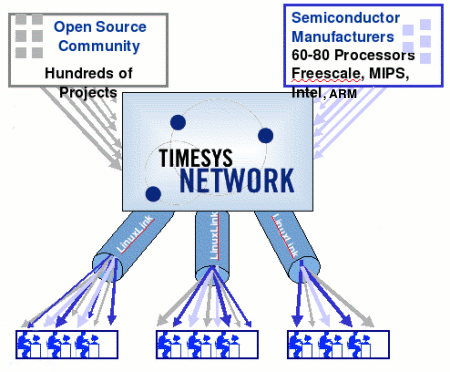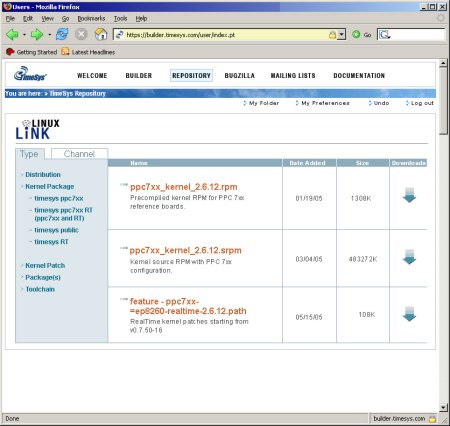TimeSys drops distro model, embraces “roll-your-own” embedded Linux services
Aug 29, 2005 — by LinuxDevices Staff — from the LinuxDevices Archive — 3 views TimeSys has embraced an intriguing new business model based on just two relatively inexpensive service/subscription products. LinuxLink Access and LinuxLink Developer target embedded Linux developers “rolling their own” — that is, assembling their own custom embedded Linux distributions from freely available… sources.
TimeSys has embraced an intriguing new business model based on just two relatively inexpensive service/subscription products. LinuxLink Access and LinuxLink Developer target embedded Linux developers “rolling their own” — that is, assembling their own custom embedded Linux distributions from freely available… sources.
CEO Larry Weidman calls the move “A repackaging of product, plus a new business model, in cooperation with semiconductor companies.”
Previously, TimeSys marketed a branded embedded Linux distribution — “TimeSys Linux” — along with supporting development tools and services. However, 70 percent of embedded Linux developers base their products not on branded distributions, TimeSys believes, but on custom, “roll-your-own” Linux, typically obtained from kernel.org and other public sources. Although TimeSys did not identify its source for the 70 percent statistic, the number is entirely consistent with LinuxDevices.com's own 2005 Embedded Linux Market Snapshot data.
Weidman explains, “Very few devices today are using commercial Linux or commercially-branded distributions. When people don't use a commercial offering, it's because the price is too high, or the capability is not there.” He also notes that commercial OS vendors are slow to update their offerings, leaving developers hankering for the latest enhancements.
VP of Marketing Michel Genard adds, “The virtue of Linux is customization. Yet if you buy a commercial Linux distribution, and you want to, say, remove busybox, the vendor says, 'Well, we cannot support you anymore.' Or, they push you to big-bucks professional services. So most developers just go it alone.”
Based its analysis of the embedded Linux market, TimeSys has therefore completely redefined its family of embedded Linux products and services, resulting in just two subscription-based products: LinuxLink Access, and LinuxLink Developer.
“Starting [August 29th], there is no more TimeSys Linux,” Genard said.
LinuxLink Access
TimeSys calls LinuxLink Access an “entry point” service that can provide a one-stop access point for “virtually all of what the developer needs,” as Genard puts it. Priced at $3K per processor architecture, the Web-based service provides a year's worth of access to a repository of “continuously updated components relevant to customer design requirements and target processors,” the company says.

LinuxLink Access is fed by semiconductor vendors, and open source software projects, and feeds embedded Linux developers
Components available through LinuxLink Access, according to TimeSys, include:
- Up-to-date Linux kernels, and kernel and other enhancements from semiconductor vendors Freescale, Intel, MIPS, and ARM
- Cross-development toolchains for Linux and Windows (Cygwin) hosts, including newest gcc, glibc, and binutils, and support for uclibc toolchains
- Automated construction of uclibc- or glibc-based filesystems, drawing on a repository of about 500 GNU/Linux software packages, ported to supported architectures and packaged as RPMs, and also available as cross-buildable, GPL-compliant source packages
- Cross-platform package development tools to help developers maintain optimizations such as package size reductions, binary transformations, and reconstruction of target RFS images to use different run-time package management formats, like iPKG or RPM
- Email alerts based on subscriber criteria
- Access to TimeSys's “Developer Exchange” community resource, including knowledge base, mailing lists, bug tracking, and documentation built and maintained by TimeSys engineers and community of subscribed embedded developers

A repository of up-to-the-minute kernels and kernel patches for specific chipsets and boards underpins LinuxLink, TimeSys says
(Click to enlarge)
TimeSys emphasizes in particular the value it believes it can deliver based on its partnerships with semiconductor vendors. “[We developed LinuxLink] in conjunction with several semiconductor vendors,” Weidman notes. “It grew out of our OnBoard program.”
The TimeSys OnBoard Program began as a kind of BSP (board support package) self-certification program that chip and board vendors could use to ensure a source of commercial support for the custom Linux kernels and drivers they distribute with their products. However, Genard says, “The semiconductor vendors fed back to us [about] its potential to allow their customers to have instant access to their latest technology for [a given] processor, on day one.”
Genard adds, “This is a significant departure from existing models that require developers to wait for features to be integrated into the next release of a vendor's distribution.”
LinuxLink Developer
LinuxLink Developer is positioned as an extension of the new LinuxLink Access service offering. It adds access to several more powerful components of the TimeSys Network, such as “LinuxEngine,” essentially the “Platform Builder” component of the earlier OnBoard program respun for use by developers, rather than chip and board vendors. LinuxLink Developer costs $5K per developer seat, per year, and includes TimeSys's well-regarded Eclipse- and CDT-based development and testing tools.
TimeSys lists the features of Developer as follows:
- Secure, private repository for customization of user space packages, and integration of additional open source and other components into the target Linux platform
- Platform Builder, to simplify development of commercial-grade, custom Linux platforms, through selection of root filesystem templates, automated build dependency tracking, fast cached builds, and an easy-to-use interface for build project management, TimeSys says.
- Eclipse 3.0 and CDT 2.0-based development and testing tools for kernel and application development, configuration and debugging, root filesystem design and configuration, integrated online and desktop-based build, verification and test tools, and project management
Analysis
TimeSys appears to have taken two significant steps. First, it has radically simplified its product line, which has undergone numerous rebrandings and restructurings over the past several years.
Much more significantly, the company may have devised a workable strategy for supporting the seemingly unsupportable — the thousands of embedded developers attempting to optimize and differentiate products by customizing Linux and other open source software packages.
Weidman put it this way: “We're playing into a world where traditional RTOS vendors viewed fragmentation as a problem. Fragmentation is our friend. Our model supports that.”
Furthermore, the new TimeSys services appear to be priced at levels that will not require a great deal of signature authority, making it possible for mid-level engineering managers to make the purchase decision on their own.
Unclear, however, is whether the approach can gain sufficient traction to create a sustainable business model. Embedded Linux developers are notoriously independent, and while the services are reasonably priced, seasoned Linux developers may remain skeptical about the real value of a centralized source for embedded Linux software components.
Still, if widely adopted, the new services could help TimeSys cross a watershed in the history of embedded Linux development. At a time when many embedded Linux vendors rely increasingly on RTOS-like business models, such as closed technology and royalties, TimeSys hopes it has struck upon a business model that provides greater flexibility and lower costs than RTOS-like models, while adhering to “both the letter and the spirit of the GPL,” as Weidman put it.
This article was originally published on LinuxDevices.com and has been donated to the open source community by QuinStreet Inc. Please visit LinuxToday.com for up-to-date news and articles about Linux and open source.